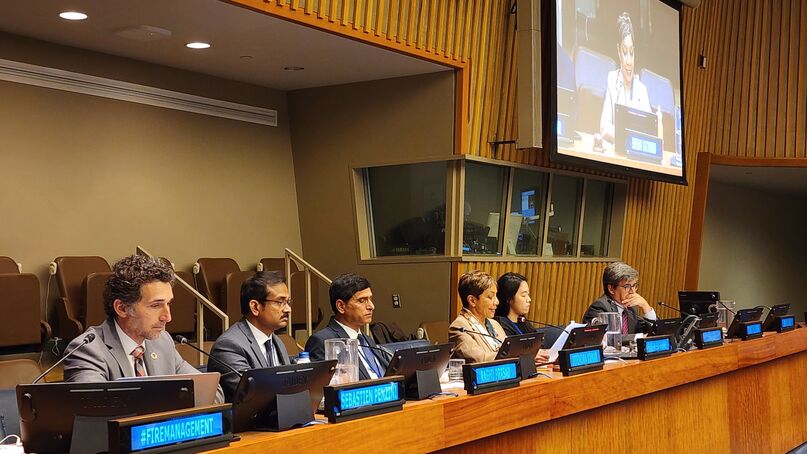Executive Director calls for more support for tropical countries on forest fire management
8 May 2024, New York, USA

Podium of the side-event, “Principles and Strategies for Integrated Landscape Fire Management through Collaborative Governance”. Photo: Soo Min Lee/ITTO
New York, USA, 8 May 2024: Fire looms as an increasing threat to tropical forests and has become a universal problem, and countries need financial and political support to implement integrated fire management, ITTO Executive Director Sheam Satkuru told at a side-event during the 19th Session of the United Nations Forum on Forests, which is taking place this week at UN headquarters in New York.
The side-event, “Principles and Strategies for Integrated Landscape Fire Management through Collaborative Governance”, was co-convened by ITTO, the Korea Forest Service, India’s Ministry of Environment, Forest and Climate Change, the Indian Institute of Forest Management, Portugal’s Agency for Integrated Rural Fire Management (AGIF), and the Food and Agriculture Organization of the United Nations (FAO) on 6 May 2024.
“The climate is changing, fire seasons are becoming longer, and fires are becoming more dangerous,” said Ms Satkuru, who moderated the event. “This is just as true in the tropics as it is in other climatic zones. Additionally, a high percentage of forest fires are human-induced and can be avoided or minimized.”
Ms Satkuru described recent ITTO projects in Ghana, Indonesia and Peru and said much more support is needed.
“With the risk escalating, countries need to do more to manage landscapes and prevent wildfires, she said. “In many tropical countries, international support and regional coordination is going to be vital.”
ITTO has advocated integrated fire management for more than three decades and more recently executed two projects in Indonesia and Peru with funding support from the Government of Japan designed to strengthen integrated fire management approaches in these countries. ITTO’s Guidelines on Fire Management in Tropical Forests, a major landmark in forest fire management published in 1997, is even more relevant and important today and is currently undergoing revision to be suitable versus current challenges and changing conditions, stated Ms Satkuru.
“The upgraded version of ITTO’s Guidelines on Fire Management in Tropical Forests, developed at the international level, will be an important tool for the development of effective policies in individual countries and will be a valuable contribution to the rising challenge of tropical forest fire management,” said Ms Satkuru. It will also facilitate consistency in fire management approaches and mutual understanding among neighbouring countries.”
Other speakers at the side-event addressed various topics related to forest fire. Mr Tiago Oliveira, AGIF President, informed participants about the Landscape Fire Management Framework, an outcome of the 8th International Wildland Fire Conference held in Porto, Portugal, in May 2023; Mr Jitendra Kumar and Mr R. Raghu Prasad spoke on the outcomes of the Country-led Initiative on forest fire held in India in October 2023; the Korea Forest Service’s Ms Jina Kim described some of the work being carried out by her organization to implement integrated forest fire management, including under the recently launched Assuring the Future of Forests with Integrated Risk Management Mechanism; and Mr Wu Zhimin, Director of FAO’s Forestry Division, spoke about the Global Fire Hub, a new platform designed to promote international efforts towards integrated fire management. Participants in the side-event engaged in a lively question-and-answer session.
In summing up the side-event, Ms Satkuru said the distinguished speakers had highlighted several important points that must be taken into consideration in dealing with what is a universal problem, not just affecting tropical countries. Efforts to provide guidance need to be well designed, focusing on prevention, management and restoration, take into account the finer details on early warning systems and monitoring, and augmented with awareness-raising and capacity-building at the national level.
Watch the video of the event: https://www.youtube.com/watch?v=BGiAl65FAjw&t=9s
Download the presentations below:


